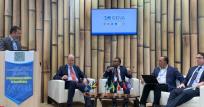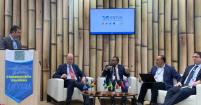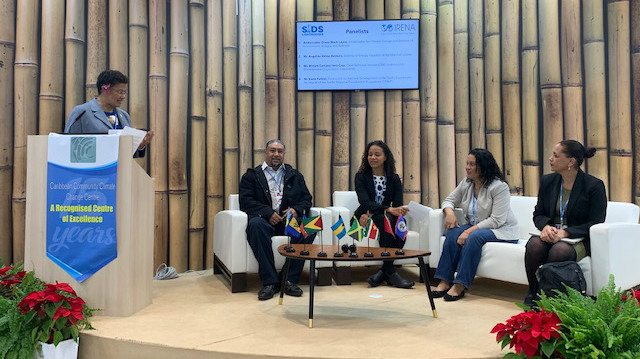

Small Island Developing States: Renewable Ambition in Pursuit of Climate Change Adaptation
Newsletter
Small Island Developing States (SIDS) are amongst the most vulnerable countries in the world when it comes to climate change. At the same time, they are amongst the most ambitious when it comes to climate action. The progress of the energy transition in SIDS was the focus of several events for IRENA during COP25 where delegates gathered to discuss facilitation of planning and financing of renewable energy projects in SIDS.
IRENA launched the SIDS Lighthouses Initiative in 2014 to support efforts in scaling up the renewable energy transition in small islands countries. Through this initiative, IRENA provides platforms to support: the development of policy frameworks; the identification of potential renewable energy resources; project facilitation; capacity building; and helping island countries find financial and project development support.
According to opening remarks by IRENA’s Director for Knowledge, Policy and Finance Rabia Ferroukhi, the energy targets for 2020 were reached already in 2017, three years ahead of schedule. Following extensive consultations, a new target was set for 5 GW of new capacity by 2023, forming the basis of a new SIDS climate package announced in September 2019 at the UN Secretary General’s Climate Action Summit. Ferroukhi said: “The energy transition cannot be viewed in isolation from the broader socio-economic structures it is built upon and upon which its long-term sustainability depends. Profound systemic changes are required to ensure a fair and just transition, one that leaves no one behind.”
Amjad Abdulla, the Director General at the Ministry of Environment, Energy and Water of Maldives, discussed the importance of this work for his country. He pointed out the need to have strong enabling environments in order to build the confidence of investors. He emphasized the importance of finding a balance between communicating ambition and vulnerability. To put it simply, doomsday scenarios do not inspire confidence in investors. The model being employed by Indian Ocean countries, the Caribbean and many in the Pacific is to focus on the concept of resilience.
Christian Lohberger, CEO of Astra Solar and advisor to Papua New Guinea noted that PNG was the first country to submit an NDC after Paris calling for 100% renewable energy by 2050. But while the country has a lot of natural resources, it does not have the necessary policies in place to achieve its targets. He reiterated the importance of having strong policy and regulatory frameworks to attract investment. Omar Ramírez Tejada, Environmental Advisor to the President of the Dominican Republic, echoed these comments and also emphasized the importance of political stability – peace, in other word – for attracting investment.
“The Republic of the Marshall Islands is committed to its NDC ambitions through its Electricity Roadmap and National Adaptation Plan”, said Angeline Heine-Reimers, Director of Energy, Marshall Islands. “We are not drowning, we are fighting!”
"Climate change is going to leave us with stranded assets. Our most valuable asset is our people - we cannot leave them stranded. Just transition is a must", said Ambassador Diann Black Layne, Ambassador for Climate Change and Director of Environment, Antigua and Barbuda.
"Ones geographical and geological conditions are the determinants for selecting viable technological solutions to the effects of climate change, understanding your natural environment is the first step in sourcing viable solutions" – Mr Sione Fulivai, Framework for Resilient Development in the Pacific Coordinator, Secretariat of the Pacific Regional Environment Programme (SPREP).
#SIDS representatives & development partners discuss how accelerating #renewables can increase their climate resilience. Synergies between renewables adaptation & mitigation is key to meet SIDS #NDCs. @IRENA’s #SIDSLighthouses at #COP25 #ItsPossible #TimeForAction pic.twitter.com/QSbSmCz3Kr
— IRENA (@IRENA) December 9, 2019
Discussions with SIDS continued in the afternoon, looking at synergies between renewable energy, adaptation and mitigation measures. Understanding the connections between climate mitigation, adaptation and development objectives is crucial for SIDS. In practice, this means sharing knowledge and expanding cooperation between policy-makers, the private sector and other stakeholders in the fields of energy, agriculture, development, water, health, and other relevant sectors. IRENA’s SIDS Lighthouse officer Arieta Gonelevu-Rakai said “leveraging synergies between renewables and other sectors such as food, water and health are important in SIDS to ensure that SIDS are supported to achieve their socio-economic objectives. IRENA is working with several partners to drive progress through targeted technical support, extensive capacity building and facilitation of projects and supporting SIDS in the implementation of renewable energy projects and programmes.”
“ SIDS are within the first affected by climate change, given their scale, geographical context, and development needs. One may also argue that SIDS are the first to adapt, and can provide critical lessons learned, particularly on the synergies between adaptation and mitigation measures. To this end, Luxembourg is supporting Cabo Verde in achieving its energy transition goals that also addresses these synergies” – Ms Miriam Caetano Vera Cruz, Chief Technical Advisor (CTA), Luxembourg Development Cooperation, Cabo Verde.

More information on SIDS




